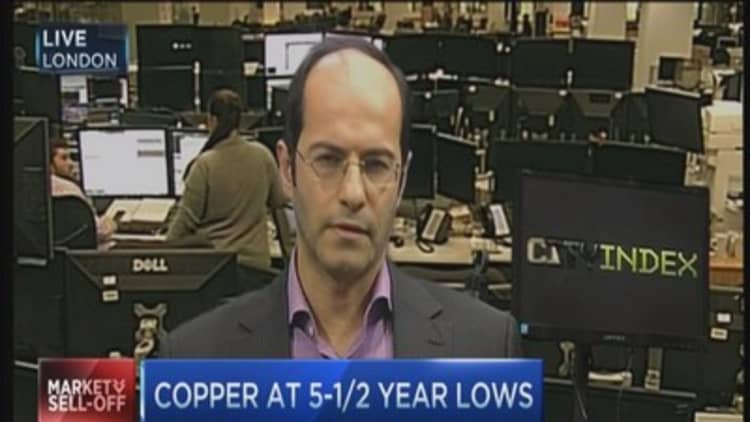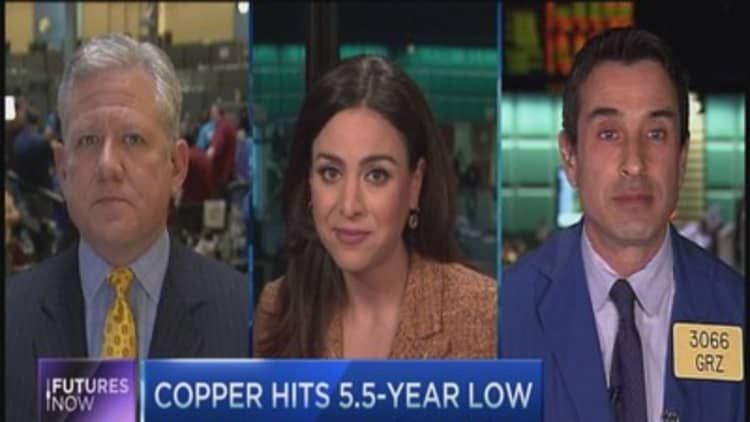
Commodities took a beating Wednesday, as prices for everything from industrial metals to grains slid on global growth concerns.
Copper, which is often seen as an important indicator of global growth because of its use in industry, fell as much as 5 percent on Wednesday. A host of other commodities, including palladium, rice and oats, also saw multiple-percentage point drops on the day. Although separate factors weighed on each asset, some factors affected the international commodities market.
That said, some expressed that the pain could soon be drawing to an end for traders.
"Commodities are going to be a big deal this year," said Michael Gurka, founder and president of BruinHill Partners. "We're going to have to ratchet our belts a bit tighter, but I think we're about to hit a bottom."
The World Bank said on Tuesday that it was lowering its global growth forecasts for 2015 and 2016 on account of economic prospects in Europe, Japan and emerging markets. That outlook is weighing on commodities traders, especially those looking at copper, AvaTrade's chief market analyst, Naeem Aslam, wrote in a Wednesday morning note.
Copper, which on Wednesday traded at its lowest levels since July 2009, has faced expectations of a major surplus from mines. Many analysts are revising those estimates, however, saying that supply should be more balanced with demand this year than previously expected.
Read MoreAre lower commodity prices here to stay?
Still, copper traders are also concerned about demand for the metal, which finds uses in both construction and consumer products. Markets are particularly focused on growth in China, traders said, with all eyes on the property market in Asia's biggest economy.
"The key might be in the second half, when we see whether the Chinese property cycle recovers modestly or if it continues to slump. That will be a key determinant in terms of how big the copper surplus will be," Xiao Fu, head of commodity markets strategy at Bank of China International, told Reuters.
Oil, of course, is among the commodities that have suffered most in recent months—with many traders saying that it is impossible to know where the bottom for crude lies.
Read MoreOil: Why nobody knows how low it will go
For his part, Gurka said he sees West Texas Intermediate crude finding support between $38 and $42 per barrel, but that it will be a slow climb back upward.
Investors are torn over whether low oil prices will prove beneficial for global growth, but some have theorized that pessimism about the energy slide is at least partly responsible for the fall in other commodities.
But as with the precipitous fall in crude, oversupply is also to blame for dragging down prices across the board.

Despite a vicious drought consuming California, the biggest U.S. agricultural state, bumper crops elsewhere have put downward pressure on farmed commodities.
The U.S. corn crop is at a record-setting 14.2 billion bushels, but is still slightly lower than numbers forecast in November, according to the USDA's January Crop Production estimate on Monday. Farmers produced more corn per acre than they did in 2013, and devoted more acreage to grain production over 2013 as well.
Soybeans, cotton and rice production all exceeded 2013 numbers, with cotton farmers producing 25 percent more cotton in 2014.
Read More Miners crash, Glencore at low as copper tumbles
As of noon EST on Wednesday, corn, oats and rice futures had fallen by 1.6 percent, 4 percent and 2 percent, respectively.
Not all commodities dropped on Wednesday. In fact, gold saw slight gains, stretching out a recent run of good fortune.
Read MoreInvestors go long gold, short copper in oil freefall
For its part, copper may be nearing a level where its cheap price actually begins to spur new building in places like China, Gurka said.
"The pain is going to be a little bit more, but truly there's value here in copper," he said. "I'm buying when the whole world's selling."
—CNBC's Robert Ferris and Reuters contributed to this report.


